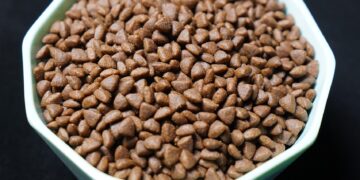Discover the Best Dog Food for Weight Loss and Allergies: Your Ultimate Guide
Finding the right dog food can be a challenging task, especially when your furry friend is dealing with weight management issues or allergies. This comprehensive guide will help you understand the essential aspects of choosing the best dog food tailored for your dog’s specific needs. Let’s dive into the world of canine nutrition and explore how you can ensure your pet lives a happy, healthy, and active life.
Understand the Basics: Why Quality Dog Food Matters
The quality of dog food you choose for your pet influences their overall health significantly. High-quality dog food not only supports weight management but also helps in alleviating allergies. It provides the necessary nutrients while avoiding common allergens and excessive calories that contribute to weight gain.
Key Nutrients in Dog Food
Proteins, fats, carbohydrates, vitamins, and minerals are essential for a balanced diet. However, the proportions can vary based on your dog’s specific health needs, activity level, and age.
Choosing Dog Food for Weight Loss
If your dog needs to lose a few pounds, selecting the right food can help them reach a healthy weight. Here are some tips to consider:
- Low-Calorie Content: Look for foods labeled as low-calorie or weight management. These formulations have fewer calories, helping your dog lose weight while still receiving the necessary nutrients.
- High in Fiber: Foods high in fiber help keep your dog full. This can reduce begging behaviors and overeating.
- Portion Control: It’s not just what they eat, but how much. Feeding the right portion sizes is critical for weight loss.
Example of a Good Weight Loss Dog Food
Brands like “SlimPup Formula” offer specialized weight management dog food that provides a balanced diet with a lowered calorie count suitable for weight loss.
Selecting Dog Food for Allergies
Allergic reactions in dogs can be triggered by certain foods. Identifying and avoiding these allergens is crucial in selecting appropriate dog food.
Common Allergens in Dog Food
Common food allergens include beef, dairy, wheat, egg, chicken, lamb, soy, pork, rabbit, and fish. Each dog is different, so it’s important to identify specific triggers for your pet.
Hypoallergenic Dog Food
Hypoallergenic dog food is designed to minimize the risk of food allergies. These foods often use protein sources that are less likely to cause allergic reactions, such as venison, duck, or kangaroo.
Practical Tips for Managing Diet and Allergies
Here are some actionable steps you can take to manage your dog’s diet for weight loss and allergies:
- Consult a Veterinarian: Always consult with a vet before changing your dog’s diet, especially for conditions like obesity and allergies.
- Transition Slowly: When switching to a new food, gradually mix it with the old food over the course of a week to avoid digestive upset.
- Keep a Food Diary: Track what your dog eats and how they react to different foods or ingredients.
- Regular Exercise: Combine a proper diet with regular exercise to effectively manage weight and improve overall health.
How to Read Dog Food Labels
Understanding dog food labels can help you make better choices. Look for the list of ingredients, nutritional adequacy statement, and feeding guidelines. Ingredients are listed by weight, so those first few ingredients are very important.
Frequently Asked Questions
How can I tell if my dog is allergic to their food?
Symptoms of food allergies in dogs include itching, excessive hair loss, recurrent ear problems, skin infections, and gastrointestinal problems such as diarrhea and vomiting.
What if my dog refuses to eat diet food?
Try enhancing their food with natural flavors like chicken broth or a sprinkle of shredded chicken. However, make sure these additions are also low in calories and free from potential allergens.
Conclusion
Choosing the right dog food for weight loss and managing allergies can significantly improve your dog’s quality of life. With the right knowledge and a bit of patience, you can find a diet that keeps your pet happy, healthy, and active. Remember, when in doubt, always consult with a professional veterinarian who can provide personalized advice based on your dog’s specific health needs.
Armed with this comprehensive guide, you’re now ready to make informed decisions about your dog’s diet. Here’s to a healthier, happier dog!














































